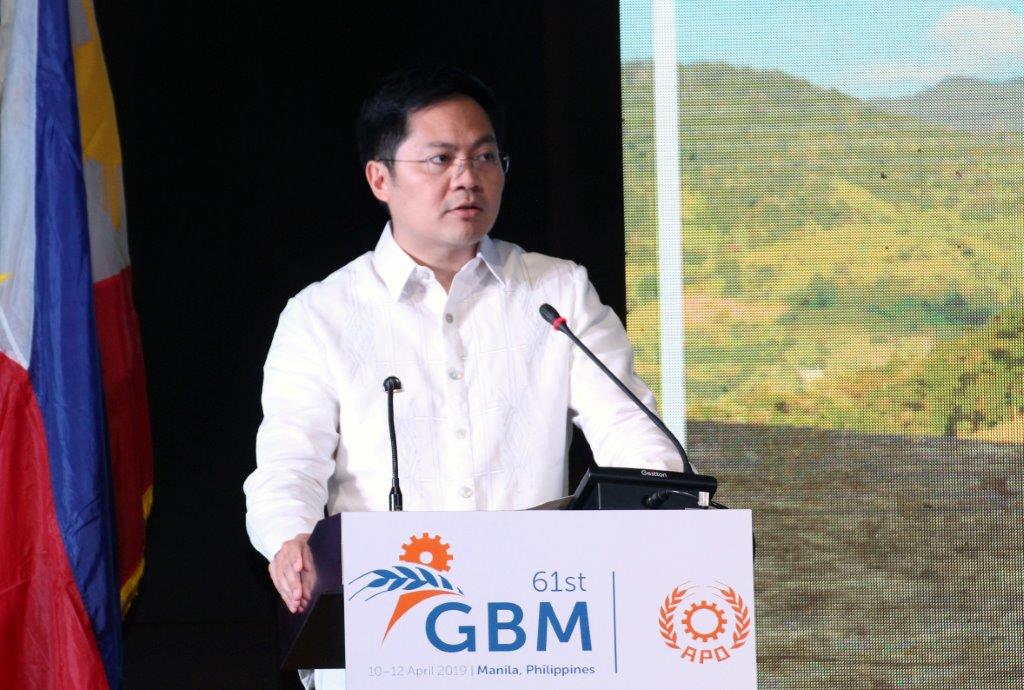
Select Page
With the Asia-Pacific region fast becoming the world economy’s center, Asian Productivity Organization (APO) member economies can reap dividends through reliance on productivity-driven growth strategies, stated APO Chair and Director for Sri Lanka J.J. Rathnasiri in his opening address at the 61st Session of the APO Governing Body (GBM) in Manila, the Philippines. He called for “a clear path with a clear vision” for sustainable socioeconomic development, emphasizing that the GBM in Manila needed “to set directions for the future of the APO.”

Philippine Cabinet Secretary Karlo Alexei B. Nograles delivering the inaugural address.
“There is no doubt that the Asia-Pacific region has shown significant growth in social and economic development factors over the last few decades. Since the world’s economic center of gravity is moving toward the Asia-Pacific, there will be many opportunities for all member countries to develop their economies during the next two decades with the application of productivity concepts,” Chair Rathnasiri said.
A total of 55 delegates, comprising APO Directors, Alternate Directors, and Advisers from 19 APO member countries, convened at the Manila Marriott Hotel for the three-day meeting of the organization’s supreme decision-making body, 10–12 April 2019. An observer from the UN Industrial Development Organization also attended.
Observing that member countries had much to gain and learn from the “admirable advocacies and pursuits of the APO,” Guest of Honor and Philippine Cabinet Secretary Karlo Alexei B. Nograles called upon all member governments in the region to reorganize their national productivity organizations and stressed that industry leaders, trailblazers, and stakeholders should make concerted efforts to “harness the very best of the development sciences, disciplines, and models in business and industry available.”
“In mobilizing a multisectoral productivity movement, the Philippine government is taking a step further in ensuring its national agenda for its people to enjoy a life that is stable, comfortable, and secure by the year 2040,” he said, adding that, “The APO, with its myriad programs and interventions revolutionizing industries and workplaces all over the region, can be a partner we can count on to make our vision a reality for our people.”
Stressing the role played by the APO, Nograles continued, “Since its inception in 1961, it is the APO that has seen with our leaders, through the same eyes of hope and inspiration, the potential of the Filipinos to learn, explore, and utilize available resources and technologies and turn them into new solutions that anticipate the need of our industries.”
Welcoming the delegates, APO Director and Undersecretary for the Regional Development Office, National Economic and Development Authority, Dr. Adoracion M. Navarro noted that as the supreme organ of the APO, the Governing Body discussed and decided on policy, finance, programs, membership, and other governance issues concerning the organization. By hosting this meeting, the Philippines believed that it was contributing to the formulation of the APO’s vision and roadmap as well as other key decisions to be made during the GBM.
In terms of the role of the APO as the premier intergovernmental organization on productivity in the region, Navarro stated that, “The improvement of productivity assumes even greater significance when one considers that productivity is actually one of the major means by which we can actualize the so-called Asian century. The Asian century concept projects the 21st century dominance of Asian economies, politics, and culture. This also assumes that certain demographic and economic trends will persist.”
However, she pointed out that the APO would have to exert more effort to ensure that productivity in its member economies continued its upward trajectory. “We have done much in the areas of productivity and quality improvement in the agriculture, industry, and service sectors, but that is not enough. How we help chart the path toward lifting productivity and the quality of lives of Asians will determine to a large extent if the Asian century will eventually be realized,” she explained.
As the APO Chair for 2018–2019, Rathnasiri announced the agenda for the GBM including discussion of proposals for setting up new Centers of Excellence, the membership contribution formula for 2021–2022, and establishing a task force to develop the APO Vision and Strategy 2025. The agenda also includes decisions on the APO Regional and National Awards and appointment of the Secretary-General for 2019–2022. In passing the Chair to the APO Director for Thailand, he urged fellow members to provide their full support to the new Chair and Secretary-General in meeting the challenges ahead.
The seats of the APO Chair and First and Second Vice Chairs rotate annually among APO members, and representatives are elected at each session to lead the GBM deliberations and decision-making processes through the next year. As its first order of business, the GBM confirmed the appointment of APO Director for Thailand Dr. Pasu Loharjun as APO Chair for 2019–2020, assisted by APO Director for Vietnam as First Vice Chair and APO Director for Bangladesh as Second Vice Chair.
Under the new APO Chair, the GBM will also discuss the Financial Report for the Year 2018 and the APO Revised Budget for the 2019–2020 Biennium. Secretary-General Dr. Santhi Kanoktanaporn will then present his Annual Report for 2018.
Photo: Development Academy of the Philippines